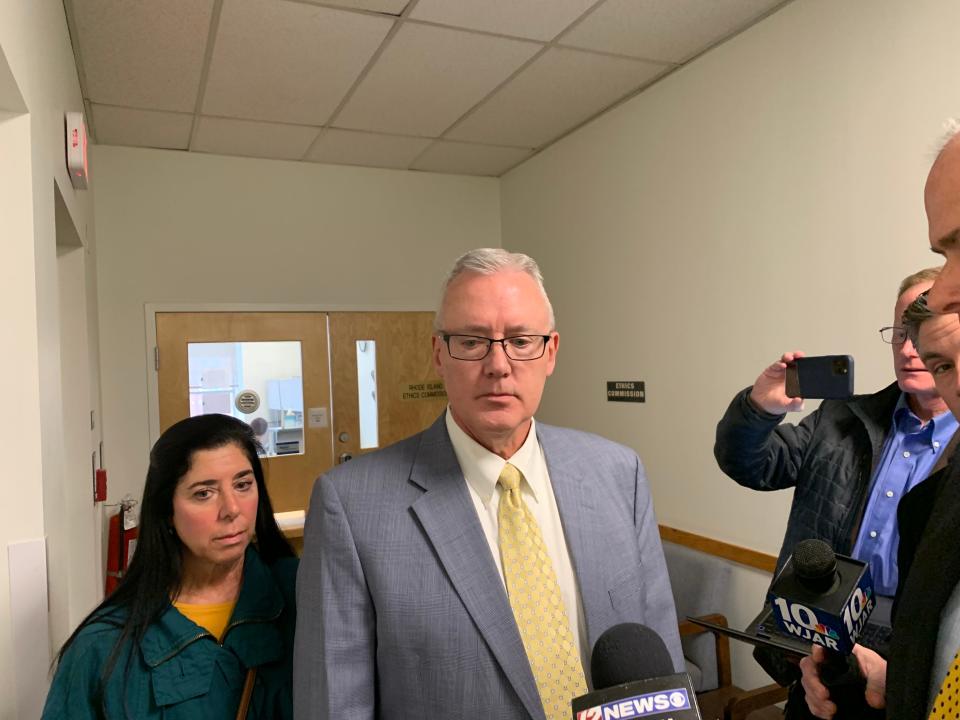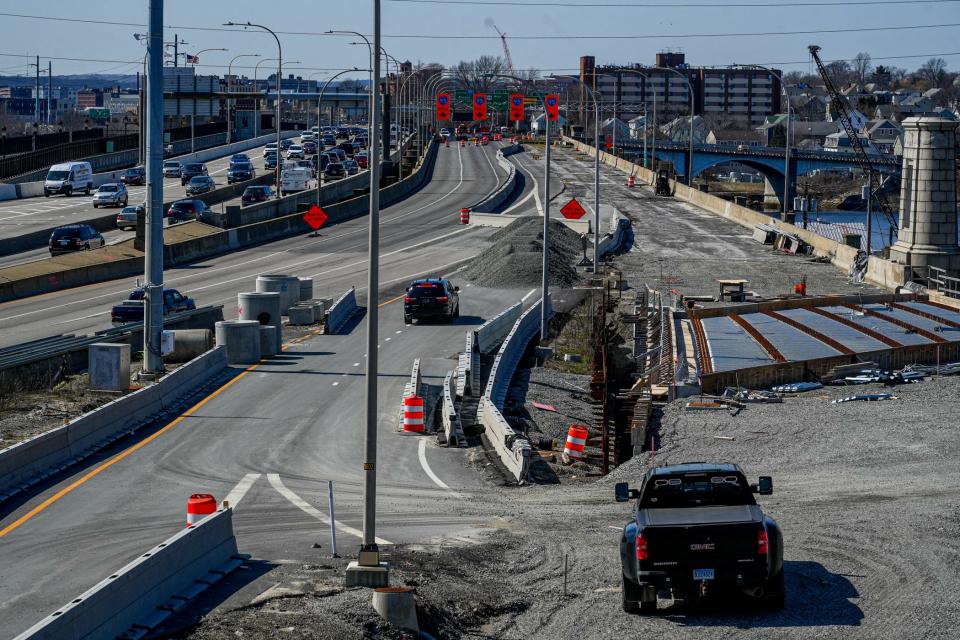How does RI's 'open records' law shield state secrets? Political Scene counts the ways
- Oops!Something went wrong.Please try again later.
Don't just tell us Rhode Island's open-records law is "famously flawed." Show us.
So wrote a reader named "Judy" after The Journal ran a front-page story on March 21 on the concerted effort by Gov. Dan McKee − and his lawyers and lieutenants − to kill legislation removing the vagaries and loopholes in the state's Access to Public Records Act that allow bureaucrats to keep the public's business secret.
Show, don't tell? No problem. The examples are legion, from then-Treasurer Gina Raimondo's refusal to make public the due-diligence reports on her hedge fund gamble to the McKee administration's refusal to give then-Senate Oversight Chairman Louis DiPalma copies of the "ILO" subpoenas.
It took a directive from the attorney general − in response to appeals by The Journal and WPRI − to get the McKee administration to make public an email detailing the behavior of the state's then-property management director, David Patten, during a day trip to Philadelphia.
In that email, the principals of Scout Ltd. detailed Patten's allegedly rude, "sexist" and "racist" comments, freebie-grabbing activities and demands for what turned into a $250 lunch at a Michelin star restaurant that wasn't normally open for lunch. ("Well you can call in a favor if you want $55M in funding.")
The attorney general's office saw no reason to keep the whole embarrassing episode a state secret. The disclosures led to an Ethics Commission investigation. Following that investigation, Patten, who no longer works for the state, agreed two weeks ago to pay a $5,000 fine.

The Journal is currently appealing for Washington Bridge records
The Rhode Island Department of Transportation is currently refusing to provide The Journal with 640 emails turned over to the U.S. Department of Justice that might shed additional light on why the westbound span of the Washington Bridge was in such bad condition.
RIDOT, which has provided "exemption logs" in the past with detailed accounts of withheld documents, did not do so in this case.
The emails were all withheld in bulk, under the blanket exemption (RIGL 38-2-2 II (K)) for: "Preliminary drafts, notes, impressions, memoranda, working papers, and work products."
Interpreted broadly, every email − in fact, almost every government document − can be withheld under that exemption, even though these were work-related emails to and from RIDOT to its employees, consultants, the Cardi Corp. and the Federal Highway Administration.
Appeal? It's in the works.
Some version of this rinse-repeat, rinse-repeat scenario plays out frequently, with government officials refusing to release documents that would shed light on how Rhode Island government operates, or making access to these records so expensive that they become inaccessible.

How does the current public records law falls short?
We asked Steven Brown, executive director of the ACLU of Rhode Island, and John Marion, director of Common Cause Rhode Island, for examples of what isn't working.
There isn't enough room for their responses, but this is Brown's "favorite," which he equates to sending a "Dear John" letter without paying for postage:
A 2014 opinion by then-Attorney General Peter Kilmartin's office says "that public bodies can charge members of the public for the time it takes to compose a letter denying an open records request."
Got it? They can charge for a denial letter.
Here, the denial – and the $15 charge – came in response to a request for Bureau of Criminal Identification (BCI) and personnel records for an individual in the state fire marshal’s office.
On appeal, Kilmartin's office reasoned that, if public agencies can charge for "search and retrieval," they can also charge for the time it takes to say no.
Brown, at the time, said it represented "a new low" in interpreting open-records law.
More examples of public records hurdles
Common Cause's Marion had a ready-at-hand list of other real life public records issues that the legislation − introduced in the House by Rep. Patricia Serpa and in the Senate by DiPalma − seeks to address (and the legislation's proposed fixes):
Alex Nunes at The Public’s Radio received more than 300 pages of almost fully redacted legal bills submitted by Westerly Town Council legal counsel Bill Conley to the town during a shoreline access dispute. The basis for the redaction? A very broad reading of an exemption for records relating to the attorney-client relationship.
PROPOSED FIX: Narrow the exemption to documents not just "related" to an attorney-client relationship, such as a government paid bill, but those traditionally covered by "privilege."
Katie Mulvaney of The Providence Journal was stymied by the Rhode Island State Police in obtaining documents detailing the alleged misconduct of a former Rhode Island State Police lieutenant colonel.
PROPOSED FIX: Make it clear that the names of police officers who have engaged in the kind of misconduct that requires disclosure to defense counsel in criminal cases (the so-called "Giglio rule") are public.
Dimitri Lyssikatos, co-founder of the Rhode Island Accountability Project, hit a wall seeking Narragansett Police Department records on the results of all internal affairs investigations between 2015 and 2018. "Even though the Rhode Island Supreme Court made clear in two decisions that these are public records, activists have had difficulty accessing them," Marion said. Attorney General Peter Neronha's office seemingly ruled in Lyssikatos' favor, and he did get some redacted records, but the ACLU blasted Neronha's office for a ruling so narrow that it "makes it more difficult for the public to monitor allegations of misconduct by police officers in the state."
PROPOSED FIX: Remove any doubt that final reports of internal police misconduct investigations are public records with redactions allowed for certain "identifying information."
Senator DiPalma, as well as various media outlets, tried and failed to get copies of the subpoenas in the investigation of the ILO education consulting contract, worth a potential $5.2 million, which was awarded by the McKee administration and drew scrutiny because the firm's leaders had ties to McKee and a competing bid was considerably lower.
PROPOSED FIX: Require the disclosure of subpoenas issued to government entities or officials unless barred by a court order.
Antonia Noori Farzan of The Journal was denied access to the names of individuals given “preferred license plates," aka low-numbered plates, through the governor’s office.
PROPOSED FIX: Ensure that the names of owners of low-numbered license plates cannot be withheld by the Division of Motor Vehicles.
More: RI's governor can give out low-numbered plates. Why won't the state tell us who has them?
What is a 'reasonable charge' for public records?
Fees can also be a hurdle in obtaining public records.
After the closure of the westbound Washington Bridge, NBC 10's Brian Crandall requested all emails from Dec. 8, 2023, through Dec. 15 between RIDOT and the governor's office related to the bridge's closure. The governor's office advised him it located "approximately 810 potentially responsive documents," which would take an estimated 67.5 hours to search, retrieve, review and, potentially, redact.
But he would have to pre-pay $1,012.50 to get the unseen documents, as the governor's office has argued that the state's APRA law, as it stands, allows a "reasonable charge" for the search and retrieval of records.
PROPOSED FIX: Waive all fees if release of the information requested would be in the public interest, meaning: "It is likely to contribute significantly to public understanding of the operations or activities of the government."
More: The Journal fought for these Washington Bridge emails. Now you can read them.
What else do the APRA reformers want to do? A lot.
The legislation seeks to make 47 changes − some big, some only technical − to the current Access to Public Records Act. Among the other proposed changes:
Limit the current exemption for emails and other communications to and from "elected officials" to communications that have "no demonstrable connection to the exercise of official acts or duties."
Require disclosure of police body-worn camera footage of incidents involving alleged use of force within 30 days of a request, with the possibility of a 20-day extension if a Superior Court judge decides that earlier release "would substantially interfere with completion of its investigation."
Prohibit public bodies from entering into contractual confidentiality agreements that conflict with APRA or from allowing private parties to make determinations as to which records are confidential.
Provide two free hours of "search and retrieval" time − instead of one hour − before the potential $15-an-hour fee kicks in.
Provide two free hours for redacting records − and prohibit charging any amount for a government employee to write a denial letter.
Require agencies to specify and/or provide an "exemption log" detailing which documents they withhold and why.
This article originally appeared on The Providence Journal: How RI's 'open records' law actually helps hide government secrets

